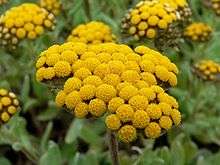Gnaphalieae
| Gnaphalieae | |
|---|---|
 | |
| Helichrysum basalticum | |
| Scientific classification | |
| Kingdom: | Plantae |
| (unranked): | Angiosperms |
| (unranked): | Eudicots |
| (unranked): | Asterids |
| Order: | Asterales |
| Family: | Asteraceae |
| Subfamily: | Asteroideae |
| Tribe: | Gnaphalieae Cass. ex Lecoq & Juillet |
| Genera | |
|
See text. | |
The pubescent foliage of Helichrysum orientale
The Gnaphalieae are a tribe of flowering plants in the family Asteraceae. It is most closely related to the tribes Anthemideae, Astereae, and Calenduleae.[1]
Characteristics
This group is most diverse in South America, Southern Africa and Australia. It is sometimes commonly called the pussy's-toes tribe. There are only a few genera in the northern hemisphere, such as Antennaria, Leontopodium (Edelweiss), and Anaphalis.[2]
The classification of the tribe into subtribes is unclear, with a number of past classifications not being supported by late 20th-century evidence.[2]
Selected genera
Sources: FNA[3]
References
- 1 2 Panero, JL; VA Funk (2002-12-30). "Toward a phylogenetic subfamilial classification for the Compositae (Asteraceae)" (PDF). Proceedings of the Biological Society of Washington. Biological Society of Washington. 115 (4): 909–922. Retrieved 2010-08-28.
- 1 2 3 4 Randall J. Bayer; Christopher F. Puttock; Scot A. Kelchner (2000). "Phylogeny of South African Gnaphalieae (Asteraceae) based on two noncoding chloroplast sequences". American Journal of Botany. 87 (2): 259–272. doi:10.2307/2656914. JSTOR 2656914. PMID 10675314.
- ↑ "Asteraceae tribe Gnaphalieae". Flora of North America. Retrieved 2007-10-06.
External links
![]() Data related to Gnaphalieae at Wikispecies
Data related to Gnaphalieae at Wikispecies
![]() Media related to Gnaphalieae at Wikimedia Commons
Media related to Gnaphalieae at Wikimedia Commons
- UniProt. "Tribe Gnaphalieae". Retrieved 2008-05-16.
This article is issued from Wikipedia - version of the 5/31/2016. The text is available under the Creative Commons Attribution/Share Alike but additional terms may apply for the media files.